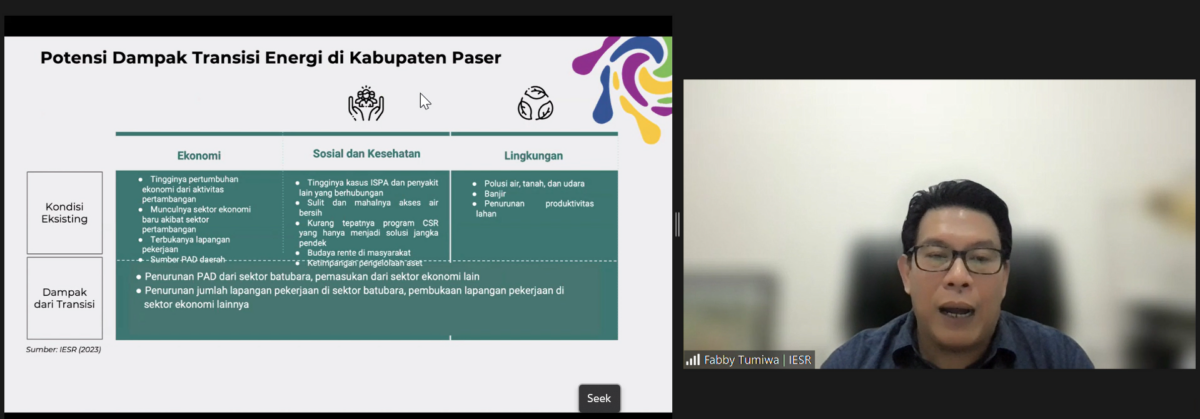
Paser, May 8, 2024 -Indonesia is trying to reinforce its commitment to renewable energy development to achieve its net-zero emission targets by 2060 or even earlier. These efforts are part of the global initiative to tackle climate change and are expected to significantly impact the coal industry, including the one in Paser Regency, East Kalimantan.
Fabby Tumiwa, Executive Director of the Institute for Essential Services Reform (IESR), underlined the importance of economic transformation in the region to respond to the ongoing energy transition. This was revealed during the Development Planning Conference (Musrebang) of the Initial Draft of the Regional Long-Term Development Plan (RPJPD) of Paser Regency for 2025-2045 on Wednesday (8/5/2024),
“Economic transformation needs to be carried out in the face of the energy transition because of the decline in local revenue (PAD) from the coal sector, and a decrease in the number of jobs in the coal sector and the opening of jobs in other economic sectors,” Fabby said.
Fabby emphasized that based on an IESR study, the contribution of the coal sector to the gross regional domestic product (GRDP) of the Paser district is enormous, more than 70 percent. However, the GRDP per capita of the Paser district has been relatively stagnant in the last decade. It is essential to undergo an economic transformation to address the issue at hand. This is where the capacity of local governments comes into play. They need to have a well-defined direction and strategy for the energy transition, establish a systematic and cohesive monitoring and evaluation system, and enhance collaboration between agencies at the regional level.
“However, the challenge is local governments’ limited authority and budget. For example, different agencies at the regional level handle new and renewable energy (NRE) affairs and NRE project funding that is not sustainable. IESR suggests the establishment of a special agency in charge of energy affairs at the City / Regency level by the direction of Government Regulation (PP) No. 18/2016 and building a horizontal communication forum between the central, provincial, and local governments, with assistance from international cooperation organizations,” said Fabby.
According to Fabby, in the context of economic transformation, several potential sectors in Paser Regency can be maximized, citing the IESR study, including agriculture, transportation, financial services, and education. However, in developing these new economic sectors, aspects of justice and equity need to be considered to avoid injustice due to extractive industries.
“Paser Regency can also utilize corporate social responsibility (CSR) funds and revenue sharing funds (DBH) for initial funding of the economic transition process. The existence of a ‘pooling fund’ for the transition program encourages regions to become independent and helps regions prepare for economic sector transformation,” said Fabby.
Furthermore, Fabby suggested that preparing human resources, such as formal educational institutions, universities, vocational schools, and training programs focused on energy and environmental transition, can help individuals prepare themselves for the workforce and increase public participation in equitable energy transition planning. This economic transformation is a crucial step towards addressing global climate change goals. It will help Paser Regency adapt to and sustain itself in the face of challenges and opportunities in the renewable energy era.
Meanwhile, Rusdian Noor, Acting Head of Bappedalitbang Paser Regency, said the Paser regional economy’s diversification is still low due to the suboptimal growth of agricultural business fields, the suboptimal development of the tourism sector, the lack of downstream industry, and the suboptimal diversification of derivative products based on natural resources (SDA). For this reason, the initial draft of the RPJD needs to answer this problem, among others.
“Paser’s RPJD will be divided into four stages. First, we strengthen the foundation of transformation as a driver of the agricultural economy. Second, focusing on accelerating transformation. Third, regional expansion in sustainable economic development. Fourth, the realization of a noble Paser that is prosperous and superior and competitive,” Rusdian said.
